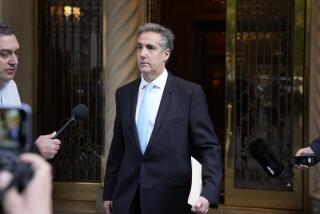Businessman Who Tipped Casey Summoned to Testify : CIA Chief Says He Got Word Oct. 7
- Share via
WASHINGTON — New York businessman Roy Furmark was subpoenaed to appear before the Senate Intelligence Committee today after CIA Director William J. Casey told a House panel it was Furmark who first tipped him to the fact that money from Iranian arms sales was being diverted to Nicaraguan rebels--well before the Reagan Administration disclosed it.
Casey himself answered a second summons to Capitol Hill in as many days for more testimony on the Iran- contra scandal amid conflicts over when--and how much--he knew of the secret rebel aid.
Leaving the House Intelligence Committee after just over three hours of closed-door testimony, Casey told reporters his first hints of the arrangement had come from Furmark, a former legal client.
“That did precipitate it, yeah,” Casey said when asked by reporters how he first learned of the diversion of money.
Tried to Draw Distinction
But he attempted to draw a distinction between Furmark’s early tip and more detailed knowledge of the arrangement, saying, “I first learned about this when (Atty. Gen. Edwin) Meese (III) told everybody” on Nov. 25.
Sources who insisted on anonymity said earlier that Casey told the House Foreign Affairs Committee on Tuesday he received information from Furmark on Oct. 7 that Canadian middlemen were angry about payments they had received and suggested some of the profits had been diverted.
The Canadians were threatening a lawsuit that would have exposed the arms deal because they had received only $10 million back when they were expecting up to $20 million, the sources quoted Casey as saying.
Committee members in the closed session were said to be stunned when Casey said that was his first hint that something was awry.
The sources said that on Oct. 8, Casey contacted then-national security adviser John M. Poindexter about the Canadian threat and was told that such a disclosure would “blow the cover” on the Iranian arms sales, jeopardizing chances of securing the return of American hostages held in Beirut.
Three congressional panels are trying to piece together how President Reagan’s clandestine 18-month initiative to improve relations with Iran mutated into a cash conduit to the Nicaraguan rebels. The Senate panel before which Furmark was called today is operating strictly behind closed doors.
‘Story More Confounding’
Before Furmark’s appearance, Assistant Defense Secretary Richard Armitage, the Pentagon officer designated to oversee the secret arms shipments to Iran, testified before the Senate Intelligence panel. Afterward, Sen. William S. Cohen (R-Me.) said that with each witness, the “picture . . . becomes clearer (and) the story more confounding.”
Casey answered questions for about 3 1/2 hours in two appearances before the Intelligence Committee today. He testified about the scandal Wednesday for more than five hours to the House Foreign Affairs Committee, and members of that panel said he frequently answered questions with “I don’t know.”
Casey today denied a Wall Street Journal report that quoted two anonymous officials as saying the CIA chief knew as early as last spring of the diversion, and that top secret messages concerning the arms deals, transmitted on the CIA “privacy” channel, were routinely placed on Casey’s desk.
“That’s wrong,” Casey said.
The secret message traffic, first revealed Monday by Secretary of State George P. Shultz, included communications between U.S. Ambassador John Kelly in Beirut and National Security Council officials about prospects for the release of U.S. captives in Lebanon.
More to Read
Get the L.A. Times Politics newsletter
Deeply reported insights into legislation, politics and policy from Sacramento, Washington and beyond. In your inbox twice per week.
You may occasionally receive promotional content from the Los Angeles Times.








